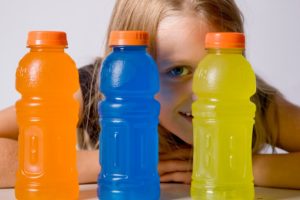Taking care of your child’s teeth is another aspect of the love you provide as a parent. However, with so many options available on store shelves, it’s not always easy to know what foods and drinks are harmful to children’s developing teeth. Here’s a look at several common types of beverages and how much sugar they contain. High sugar drinks could be contributing to the cavities your child’s dentist finds during periodic examinations.
 Soft Drinks
Soft Drinks
Cola drinks have been a staple of American snacking for decades, but these drinks are high in sugar content. A 20-ounce soda contains 65 grams of sugar. That’s enough sugar to do significant damage to teeth, as well as create problems with weight and blood sugar levels.
Sports Drinks
Sports drinkshave become a popular option for active people. However, these drinks contain high amounts of sugar, about 21 grams in a 12-ounce glass, which can contribute to weight problems and tooth decay.
Fruit Juices
A 16-ounce glass of fruit juice such as apple or orange juice contains 48 to 52 grams of sugar. Although fruit juices have other nutritional benefits, the amount of sugar can be damaging to teeth if children drink it throughout the day.
Iced Tea Drinks
Commercially sold iced tea drinks contain up to 51 grams of sugar, which can damage teeth and create weight problems when consumed throughout the day. Depending on the flavorings added to the tea, the amount of sugar could be even higher.
Lemonades
The amount of sugar in lemonades can vary widely. Homemade lemonade can be adjusted to provide less sugar and a more tart flavor. Commercially sold lemonade can have up to 67 grams of sugar, which can inhibit appetite, add empty calories and damage tooth enamel.
Milk
Milk is one of the less damaging beverages for children’s teeth, generally containing about 11 grams of sugar. For those who avoid dairy products, soy milk contains 8 grams of sugar, while almond milk contains about 7 grams of sugar.
When children ask for something to drink, the best beverage you can offer them is water, which is free of sugar and additives and helps to flush debris and bacteria from their teeth. Avoid sugary drinks as much as possible!
If you’re concerned your child might have a cavity or if it’s time to schedule his or her next cleaning, give Playtime Dental a call.


